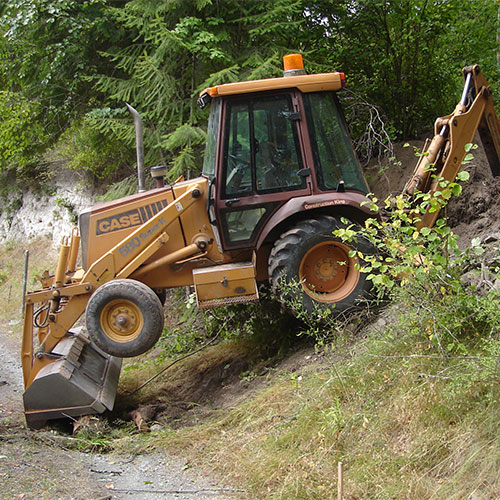Dump Truck Companies in Ohio - Reliable Dump Truck Services Across Ohio
Dump Truck Companies in Ohio - Reliable Dump Truck Services Across Ohio
Blog Article
Comprehensive Excavation Methods: Mastering the Basics for Success
In the realm of construction and civil engineering, the value of effective excavation methods can not be overemphasized. The mindful planning, exact implementation, and careful attention to detail called for in excavation jobs require a comprehensive technique that includes different fundamental facets. From first soil analysis to the application of safety and security measures and routine progression surveillance, mastering these core elements is crucial for achieving success in any type of excavation venture. The real proficiency exists not simply in understanding these fundamentals yet in flawlessly incorporating them to browse the complexities of excavation projects with finesse.
Recognizing Excavation Job Preparation

The initial phase of any type of excavation task is the preparation stage, where crucial decisions are made that can significantly impact the result of the job. Understanding the job timeline, range, and spending plan constraints is critical for creating a thorough excavation plan that makes certain the project's success.
One secret element of excavation task planning is the advancement of a detailed timeline that outlines the sequence of due dates, turning points, and tasks. This timeline offers as a roadmap for the project team, allowing them to track progression and make essential modifications to guarantee the project remains on timetable. Furthermore, a well-defined budget that makes up all expenditures, including equipment service, labor prices, and products, is vital for preventing cost overruns and hold-ups. By meticulously considering all these aspects during the drawing board, excavation projects can be executed successfully and properly, bring about successful outcomes.
Soil Analysis and Site Evaluation
Performing detailed soil analysis and website assessment is a critical action in the preparation stage of any excavation task. Soil evaluation includes establishing the composition, structure, and homes of the soil at the excavation site. This details is critical for understanding the dirt's bearing capability, wetness content, and potential for erosion, which are key consider determining the excavation approaches and tools required for the task.
Site analysis exceeds dirt evaluation and incorporates a more comprehensive analysis of the total website problems. This analysis consists of identifying any potential hazards, such as underground utilities, environmental problems, or unpredictable surface, that might affect the excavation process. By thoroughly evaluating the site, job managers can create reliable excavation methods that focus on security, effectiveness, and ecological security.
Using innovative innovations like ground-penetrating radar, dirt tasting, and drone studies can improve the accuracy and efficiency of soil evaluation and website examination. Investing time and resources in these preliminary steps can inevitably save time and protect against costly delays or difficulties during the excavation procedure.
Equipment Option and Usage
Effective excavation projects count heavily on strategic tools option and use to make certain optimum efficiency and performance. Selecting the appropriate equipment for the job is critical in making the most of performance and decreasing downtime. Factors more info here such as the type of dirt, depth of excavation, and project range play a considerable function in determining one of the most suitable equipment for the task at hand.

Along with selecting the ideal devices, correct usage is crucial to task success. Operators must be educated to deal with the equipment securely and successfully - dump truck companies in ohio. Regular upkeep checks and prompt repair work help prevent breakdowns and guarantee regular performance throughout the task
Precaution and Regulations Compliance
In the realm of excavation jobs, prioritizing safety steps and compliance with laws is extremely important to ensuring a lawfully audio and protected functional setting. Safety and security actions include a series of methods, consisting of performing extensive website evaluations, executing proper signs and barriers, and providing ample security training for all workers involved in the excavation process. Adherence to regulations, such as OSHA needs in the United States, makes sure that the excavation task meets the essential requirements to protect workers, onlookers, and the surrounding setting.

Tracking Progression and Adjusting Methods
Just how can forecast supervisors efficiently track the innovation of excavation projects and adapt their methods as necessary to optimize end results? Tracking development is essential for making certain that excavation projects stay on track and meet due dates.

Conclusion
To conclude, understanding the fundamentals of extensive excavation approaches is essential for the success of any kind of job. By understanding job preparation, examining dirt and website conditions, selecting suitable devices, abiding by security laws, and checking progress, project managers can make certain a reliable and smooth excavation procedure. Implementing these methods will certainly bring about effective outcomes and lessen possible threats or problems throughout the excavation project.
The first stage of any type of excavation task is the planning stage, where important decisions are made that can dramatically impact the end result of the job. Comprehending the task timeline, spending plan, and range constraints is critical for developing a comprehensive excavation plan that ensures the task's success.
Exactly how can project supervisors effectively track the development of excavation tasks and adjust their strategies appropriately to optimize results? By closely checking development and being prepared to adapt approaches, job supervisors can improve the general success of excavation jobs.
By recognizing job preparation, evaluating soil and site conditions, picking ideal equipment, conforming with safety and security laws, and monitoring development, task supervisors can make certain a reliable and smooth excavation procedure.
Report this page